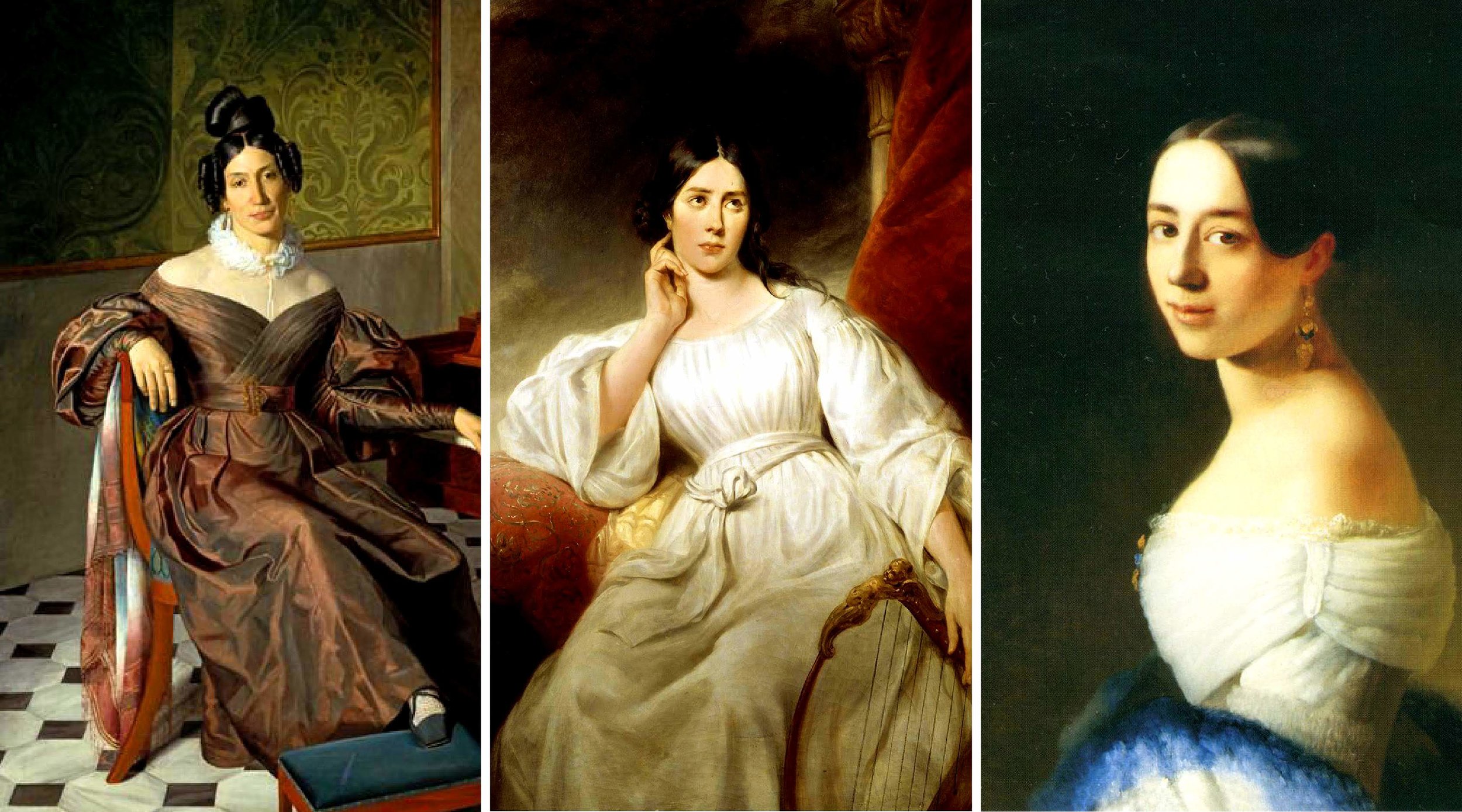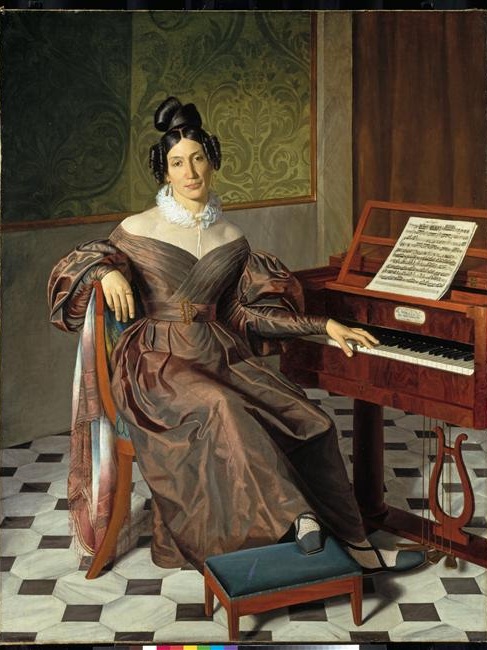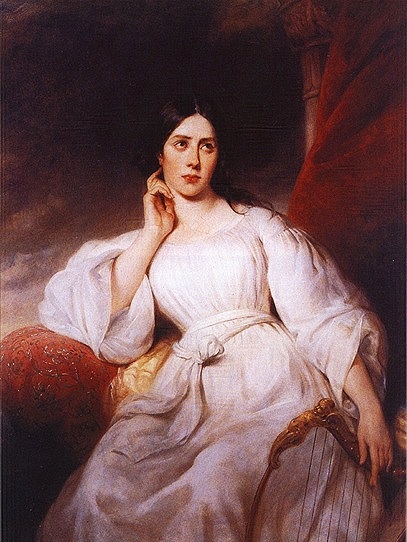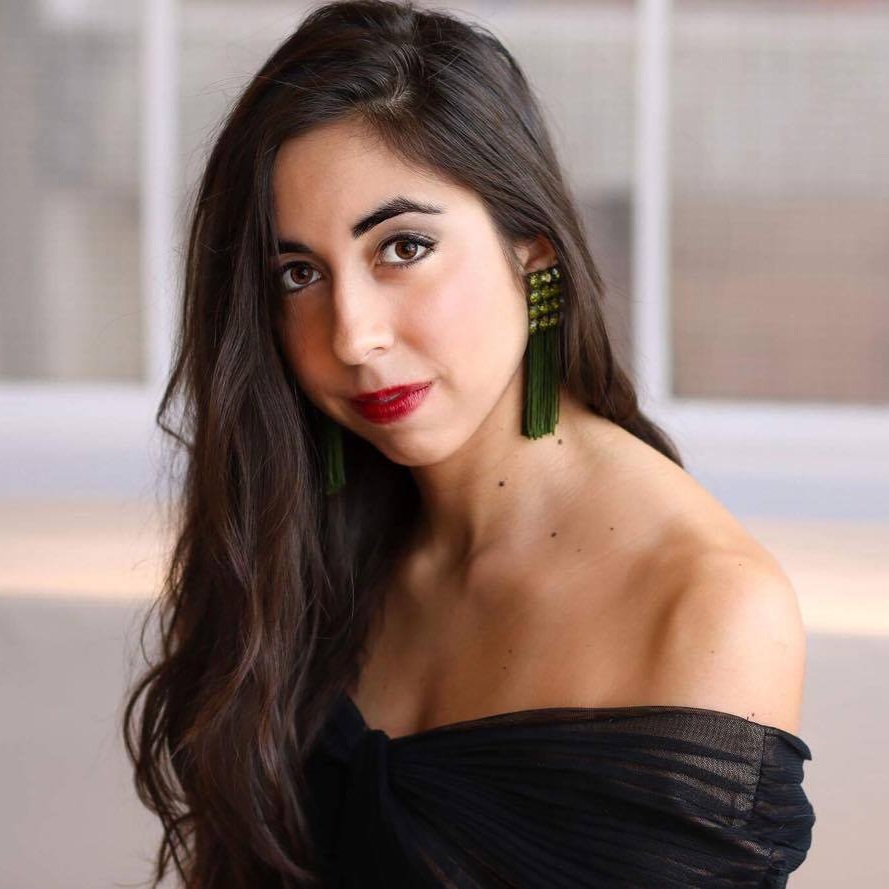New Camerata Opera
and
A Modern Reveal
present
Leading Ladies Liberated
Celebrating the lives and works of 3 iconic opera divas in song and story:
Isabella Colbran, Maria Malibrán & Pauline Viardot-García
Friday, May 3, 2019 | 7:00PM
The Flea Theater
20 Thomas Street
New York, NY 10007
Artistic Directors
Nicole Leone
Randi Marrazzo
Cendrillon Stage Dirctor
Victor Khodadad
Musical Director
Eric Sedgwick
Stage Manager
Miriam Rochford
Cast
Lily Arbisser
Samina Aslam
Eugenia Forteza
Nicole Leone
About the Program
Colbran, Malibrán and Viardot were famous opera singers during the bel canto era in 19th-century Europe, specifically for their renditions of roles by Rossini, Donizetti and Bellini. Despite being best known for their singing careers, all three women composed art songs that are little known and rarely performed. Tonight, we’ll present both the arias they were famous for and the songs they composed.
The Ladies
+ Isabella Colbran
b. February 2, 1785, Madrid, Spain d. October 7, 1845, Bologna, Italy
Isabella Colbran, daughter of the King of Spain’s court musician, Gianni Colbran, was born in Madrid in 1785. She began her musical studies at the early age of six with composer, Francisco Pareja, castrato Carlo Martinelli, and the famous singer and composer, Girolamo Crescentini. Her dramatic soprano voice and sizeable range afforded her an extremely successful opera career beginning in Bologna and continuing in Milan, Venice, Rome and Naples. For nearly a decade in the early 19th century, Colbran was considered one of the best singers in Europe and garnered an extremely devoted following, especially in Naples, where the King regarded her very highly. There, she met and worked with her future husband, composer Gioachino Rossini. When he heard her passionate singing, he began to write dramatic operas such as Elisabetta, regina d'Inghilterra (1815) and Otello (1816), specifically for her as the prima donna.
Stendahl, a well known critic who favored Rossini but was sometimes critical of Colbran, described her talent as, ”a wealth of exquisitely observed detail [that] could be read into the statuesque calm of her every gesture.” Rossini and Colbran eventually married in Bologna, but their marriage later ended in divorce when Colbran was due to retire from singing. Colbran’s voice and sense of pitch in performance began to decline around 1815, though she sang publicly for several years afterward.
As a composer, Colbran wrote four collections of songs, each one dedicated to an important influence: the Queen of Spain, the Empress of Russia, the Prince of Beaumarchais, and one of her teachers, Crescentini. Using her theatrical persona as a guide, her compositions of conventional songs often included dramatic elements that painted text and offered a nuanced and deep sense of character. For emphasis, she often added embellishments and fermati to enhance repeated figures, usually prior to the return of the initial melodic statement.
Colbran died in Bologna in October 1845.
+ Maria Malibrán
b. March 24, 1808 Paris, France d. September 23, 1836 Manchester, United Kingdom
Living and dying dramatically, Maria Malibrán, the older sister of Pauline Viardot-García, was considered a facile, charismatic singer. She studied voice with her father, Manuel García, esteemed vocal pedagogue and tenor who often sang in Rossini operas. García, a volatile teacher, was quite strict with Malibrán and often drove her to tears during their lessons. Despite her father’s severe treatment towards her, Malibrán developed solid vocal technique and made her operatic debut in London at the King’s Theatre at the age of 17. Premiering a number of operatic roles, she sang to acclaim in Italian and English operas in Paris, London and throughout Europe. She was romantically expressive with great vocal flexibility, a wide range and spontaneous acting skills.
In 1825, the same year as her London debut, Malibrán’s father took his family to the United States and established an Italian opera troupe in New York that featured performances by the entire family. Singing Rossini, Mozart and García’s operas was excellent practice for Malibrán. While in New York, she managed to escape her father’s domination by marrying a seemingly wealthy banker, Eugène Malibrán, at which point she refused to continue singing in her father’s opera company. Malibrán’s new husband was 28 years her senior and in terrible debt; much of her income was used to pay off the money he owed. Their brief marriage failed and Malibrán eventually left New York.
When she returned to Paris, Malibrán performed regularly thanks, in part, to Rossini’s promotion of her. In 1829, Malibrán, now a successful opera singer, met Charles de Bériot, with whom she fell in love and eventually married. In 1836, while in London performing, now married and expecting a child, she went horseback riding with friends. The horse unexpectedly threw her and she was dragged on the ground. Even though she was seriously hurt, she chose to ignore her injuries and continued performing. She died soon after.
While Malibrán is mostly remembered for her dramatic and fiery operatic performances, she composed about 50 songs in French, Italian, and English in her spare time. These romances, generally strophic, with settings inspired by styles from different countries, feature simple accompaniments that emphasize the melodic vocal line.
+ Pauline Viardot-García
b. July 18, 1821, Paris, France d. May 18, 1910, Paris, France
Pauline Viardot-García, a French born singer and composer of Spanish descent, was a leading figure in late-19th century musical life throughout Europe. She was born into a famous musical family; her father, Manuel García, was an esteemed vocal pedagogue and her older sister, Maria Malibrán, was one of the most adored opera singers of her time. Viardot quickly became a sensation after her operatic debut in London and enjoyed an international career of stardom that she maintained for most of her adult life. She made significant contributions to the operatic stage, music composition and in the world of music salons, which she often held in her home. She also had a tremendous influence on the careers of many of France’s most well known composers including Saint-Saëns, Liszt, Gounod, Berlioz, Meyerbeer and Fauré.
In 1840, when she was 18-years-old, Viardot married Louis Viardot, director of the Théâtre Italien and 21 years her senior. This marriage, while practical, was a great sacrifice for Viardot in her life; by succumbing to the societal expectation that women were intended to marry and start families in order to gain protection and respect in the world, she relinquished the opportunity to have a passionate romantic relationship. This circumstance tormented her, especially with regards to Ivan Turgenev, the Russian author with whom she maintained a love affair for most of her adult life.
With Louis, Viardot had four children. She did not, at any point in her career, allow the traditional responsibilities of wife and mother overshadow her musical pursuits but instead was fiercely dedicated to her art at all costs. While her voice was the instrument through which she achieved her great career, Viardot’s operatic success only spanned a period of twenty-two years due to the strain she put on her voice and her insistence on singing any music she enjoyed, whether it suited her or not.
As a composer, Viardot was drawn to dramatic texts. She wrote 100 songs in several different languages and styles with the technical abilities of herself and her students in mind. She set poems by Musset, Turgenev, Pushkin, Gautier, Mörike, and Goethe. Most of her music was published while she was still alive, a testament to her popularity and to the quality of her compositions. She famously transcribed 12 of Chopin’s mazurkas, which he gave her permission to write. She also arranged some of Schubert’s waltzes, one of Brahms’ Hungarian Dances as a duet, and several movements of Haydn’s string quartets for voice and piano. Beyond her song output, Viardot composed four operettas (three with with libretti by Ivan Turgenev), an opera, Cendrillon, chamber music, and several small-scale piano works.
Viardot was unafraid to approach art in her own way, even when that meant sacrificing time with her family, the longevity of her voice, and relationships with friends and colleagues. The breadth of her compositions and her insistence on communicating with others by writing music in several languages and styles, speaks to her worldliness and desire to connect and find common ground with her audience.
The Artists
+ Lily Arbisser
Lily Arbisser possesses an “individual-timbred soprano” (Opera News) that “floats effortlessly” over the orchestra (www.feastofmusic.com). In recent seasons, Arbisser debuted such roles as Monica in Menotti’s The Medium at the Phoenicia International Festival of the Voice, Pamina in Mozart’s Die Zauberflöte with Opera Seabrook, and enjoyed a fruitful collaboration with pianist Jason Wirth in performances of Poulenc’s La voix humaine. Arbisser is also a frequent soloist with choral groups in and around the New York area, most recently singing in Beethoven’s Symphony No. 9 with Princeton Pro Musica. This spring Arbisser makes her debut at Weill Recital Hall at Carnegie Hall as Suzu in Riyochi Saito’s chamber opera “Dojoji.” In August she will be a fellow at the Ravinia Steans Music Institute in Chicago. Arbisser graduated summa cum laude and Phi Beta Kappa from Princeton University with a Bachelor of Arts in Art and Archaeology and a Certificate in Vocal Performance. She holds a Master of Music from Mannes College.
+ Samina Aslam
Alaska-born soprano Samina Aslam has been praised for her "velvet tone that can build to a powerful clarion". Samina recently performed in New Camerata Opera’s 2018-2019 season as the title role in Holst’s Sāvitri. She joined Ars Musica from 2016-2018 as a member of their Encore Young Artist Program, with whom she performed as a soloist in works including Bach’s B minor Mass, Poulenc’s Stabat Mater, and Beethoven’s Symphony No. 9. Samina studied as a Resident Artist at the Boston University Opera Institute, where her repertoire included the title role of Cendrillon, Zina in Dark Sisters, Donna Elvira in Don Giovanni, and Micaëla in La tragédie de Carmen. While in Boston, she also performed with Boston Lyric Opera, Masterworks Chorale, and Opera del West. Samina completed her graduate studies at the Cincinnati College-Conservatory of Music and received her Bachelor in Music from Louisiana State University. She has performed in Europe with Kashu-do Opera Studios in Sweden, CCM Spoleto, and with the Franco-American Vocal Academy. Her other U.S. appearances include performances with Opera NEO, Opera North, and Cincinnati Opera.
+ Eugenia Forteza
French-Argentinean Soprano Eugenia Forteza has been praised for her “soulful mood” (Opera Wire) and “fine tone and spirited acting” (Voce di Meche). Eugenia was a Finalist at the 2017 Concorso Internazionale di Canto Katia Ricciarelli and made international debuts in Colombia, Argentina and Canada in the last year. Recent engagements in 2019 include María de Buenos Aires with Bare Opera, creating the role of Ugly Duckling in Felix Jarrar’s new opera Mother Goose, Frasquita in Carmen with Hudson Opera Theater and being a cover artist for New Amsterdam Opera’s Hériodade. This summer Eugenia will reprise the role of Eufemia in La Bohème by Leoncavallo for the Festival d’Art Vocal in Montréal. Eugenia holds a B.M in Vocal Performance (Summa cum Laude) from Boyer College of Music at Temple University and a M.M in Opera from Mason Gross School of the Arts at Rutgers University. For more information please visit eugeniaforteza.com and @fortezaeugenia & @360ofopera on social media.
+ Nicole Leone
Soprano, Nicole Leone has sung throughout New York City and Philadelphia as a soloist in opera, concert, and recital. Her operatic roles include Don Ettore in La Canterina, Olga in The Merry Widow, Arminda in La Finta Giardiniera, Ellen Olenska in the New York City premiere of the new opera, The Age of Innocence, Barbarina in Le Nozze di Figaro, Zerlina in Don Giovanni, Annina in La Traviata and Una Conversa in Suor Angelica. In concert, she has performed as soprano soloist in Ein deutsches Requiem, Schubert's Mass in G and Bach Cantata No. 140.
Nicole is an ardent supporter of women composers and contemporary classical music and is co-founder of A Modern Reveal, an online resource promoting the songs and stories of overlooked historical women composers.
Nicole holds a M.M. in Voice Performance from Temple University and a B.A. in Economics from New York University. She currently resides in New York City where she freelances as a musician and consultant.
+ Eric Sedgwick
ERIC SEDGWICK has performed with many of music’s top talents including Leona Mitchell, Sanford Sylvan and Marni Nixon, Broadway leading ladies Sarah Rice, Carole Demas and Debra Monk, and English hornist Thomas Stacy of the New York Philharmonic. He is a staff vocal coach at the Manhattan School of Music, a staff accompanist for the Tanglewood Music Center, and has served as rehearsal pianist for the Boston Symphony Orchestra, under the batons of Michael Tilson Thomas, Bramwell Tovey, John Williams and Andris Nelsons. He is a regular pianist for events with the Metropolitan Opera Guild, and has worked for Carnegie Hall’s Music Education Workshops with Joyce DiDonato, as well as for the International Vocal Arts Institutes in New York and Montreal. He is a graduate of Manhattan School of Music and Brown University.
Creative Team
+ Victor Khodadad
A classically trained actor and singer, Victor Khodadad received his MFA in Acting from the American Conservatory Theater in San Francisco and a Graduate Professional Diploma in Vocal Performance from The Hartt School of Music in Hartford, CT. He has studied singing with Jerome Pruett, Nicolai Gedda and David Jones. Having performed regionally across the United States, Mr. Khodadad’s repertoire includes Tamino, Don Ottavio, Ferrando, Sesto, Alfredo, The Duke, Rodolfo, Roméo, Lensky, Alfred, Eisenstein, Cavaradossi, Gérald, Nadir, Des Grieux, Nemorino, Count Almaviva and The Male Chorus. Oratorio works include The Messiah, Elijah, The Creation, The Seasons and Die erste Walpurgisnacht. He is a co-founder of New Camerata Opera and the Outreach Director. Camerata Piccola, the branch of NCO that produces children’s opera, brings quality productions for students from Pre-K through High School. Please contact us at info@newcamerataopera.org for more information.
Production
+ Miriam Rochford
Miriam Rochford is a freelance stage manager who finally considers herself a New Yorker, 3 years after she moved here from her native Florida. Miriam has had the pleasure and good fortune to stage manage for several opera and theatre companies in her time here in NYC. You may have seen her name attached to projects with New York Deaf Theatre, dell'Arte Opera Ensemble, Ensemble Studio Theatre, and Bronx Opera. She is a founding member of ASL Cabaret NYC, and is never happier than when she is creating opportunities for Deaf talent. She recently launched her website miriamrochford.com, of which she is very proud even though it is the most basic Wix format available. Miriam sends her love and good wishes to her Florida family, and keeps her Dad in her thoughts at every turn.
The Program
Arias sung by the Leading Ladies
“Assisa a un pié d'un salice” from Otello
Gioachino Rossini
(1792-1868)
Lily Arbisser
Isabella Colbran sang Desdemona in the world premiere performance of Otello written by her husband, Rossini, in 1816. Pauline Viardot-García made her operatic debut in this same role at the age of 17 in 1839.
“Temerari...Come scoglio” from Così fan tutte
Wolfgang Amadeus Mozart
(1756-1791)
Nicole Leone
Viardot-García sang Fiordiligi in concert throughout her career, though she never sang the role in a full production.
“Oh! quante volte” from I Capuleti e i Montecchi
Vincenzo Bellini
(1801-1835)
Eugenia Forteza
Pauline Viardot-García and Maria Malibrán both sang Romeo in I Capuleti e i Montecchi throughout their careers.
“O nube che lieve per l'aria ti aggiri...Nelle pace del mesto riposto” from Maria Stuarda
Gaetano Donizetti
(1797-1848)
Samina Aslam
Maria Malibrán premiered the role of Maria Stuarda in Donizetti’s opera in 1835.
Music composed by the Leading Ladies
“Ch'io mai vi possa lasciar d'amare” from Six petits airs italiens
Isabella Colbran
(1785-1845)
Lily Arbisser
Il ritrovo
Maria Malibrán
(1808-1836)
Eugenia Forteza
Die Sterne
Pauline Viardot-García
(1821-1910)
Samina Aslam
-INTERMISSION-
Il Mattino
Maria Malibrán
Samina Aslam
Voi siete, o luci belle from Six petits airs italiens
Isabella Colbran
Nicole Leone
“Benché ti sia crudel” from Six petits airs italiens
Isabella Colbran
Lily Arbisser
“Na kholmakh Gruzii” from 12 stikhotvoreniy
Pauline Viardot-García
Nicole Leone
Les Filles de Cadix from Six mélodies
Pauline Viardot-García
Eugenia Forteza
-PAUSE-
Selected scenes from Cendrillon,
a chamber operetta by Pauline Viardot-García
Cast:
Cendrillon - Lily Arbisser
La Fée - Eugenia Forteza
Maguelonne - Samina Aslam
Armalinde - Nicole Leone
A Modern Reveal: Songs and Stories of Women Composers is an online resource dedicated to promoting the vocal works and stories of historical female composers who have been overlooked for centuries. This project was founded in November 2018 by Randi Marrazzo and Nicole Leone.
The impetus to create A Modern Reveal grew out of our passion to explore the lives of fascinating and talented female composers and give them voices today by offering unique insights into the successes and challenges they faced during their careers.
Our goal in doing this advocacy work is to increase the awareness of the disproportionate programming of music by women in all classical music genres and promote the underrepresented works by women that deserve their due place in the canon.
THANK YOU
Thank you to all the members of NCO for helping this performance take shape. We are grateful to them for their constant encouragement and for all the work they have done to put this concert together. Special thanks go to Victor Khodadad for his meticulous direction of our program, specifically the Cendrillon scenes.
To learn more about the composers you heard tonight, and all the women currently featured on A Modern Reveal, please check out our website.
Special thanks to
Derek Box
Kristina Dunatov
Taylor Holister
Marty Jeiven
Nora Lacy
Nicole Leone
Isabella Marriott
Mercy O’Bourke
Andrew and Linda Parr
Follow A Modern Reveal















